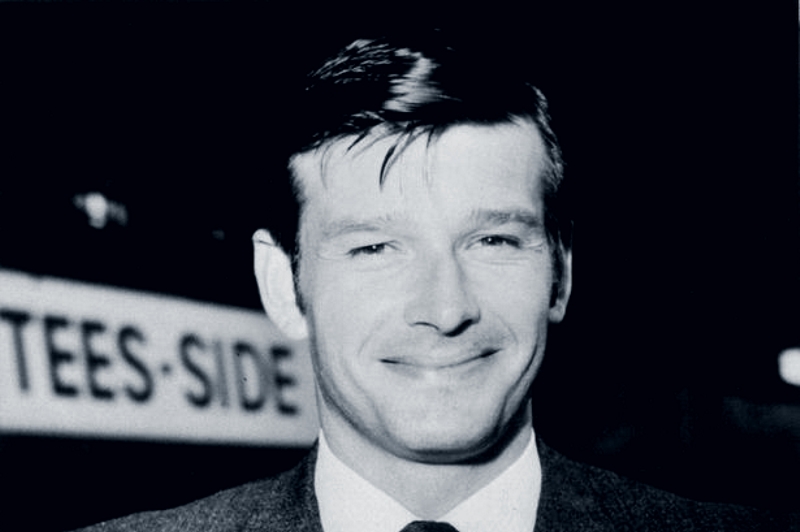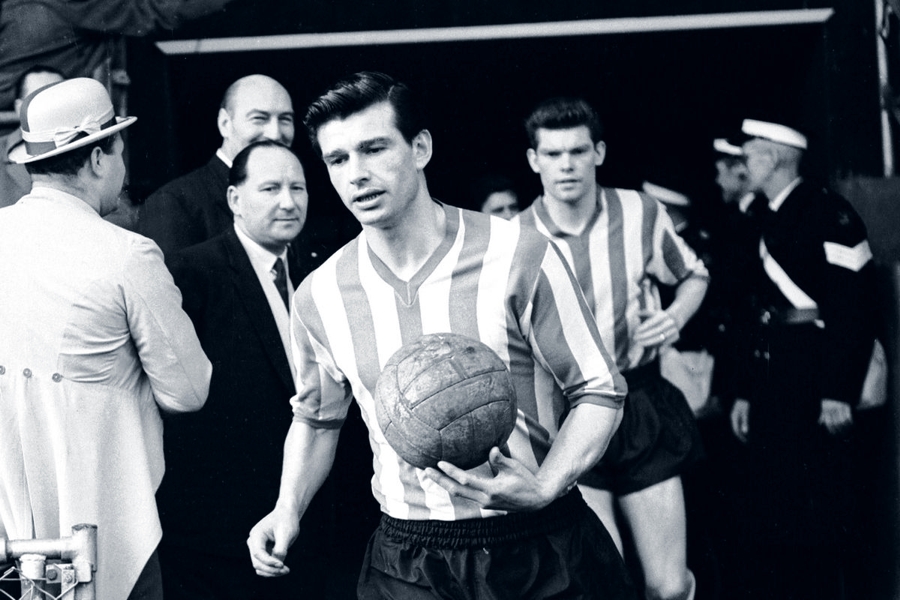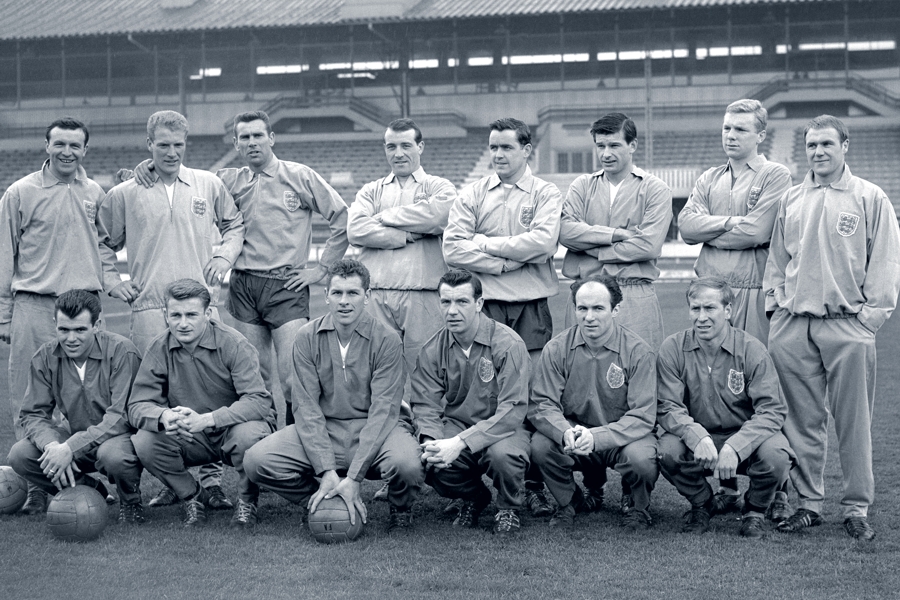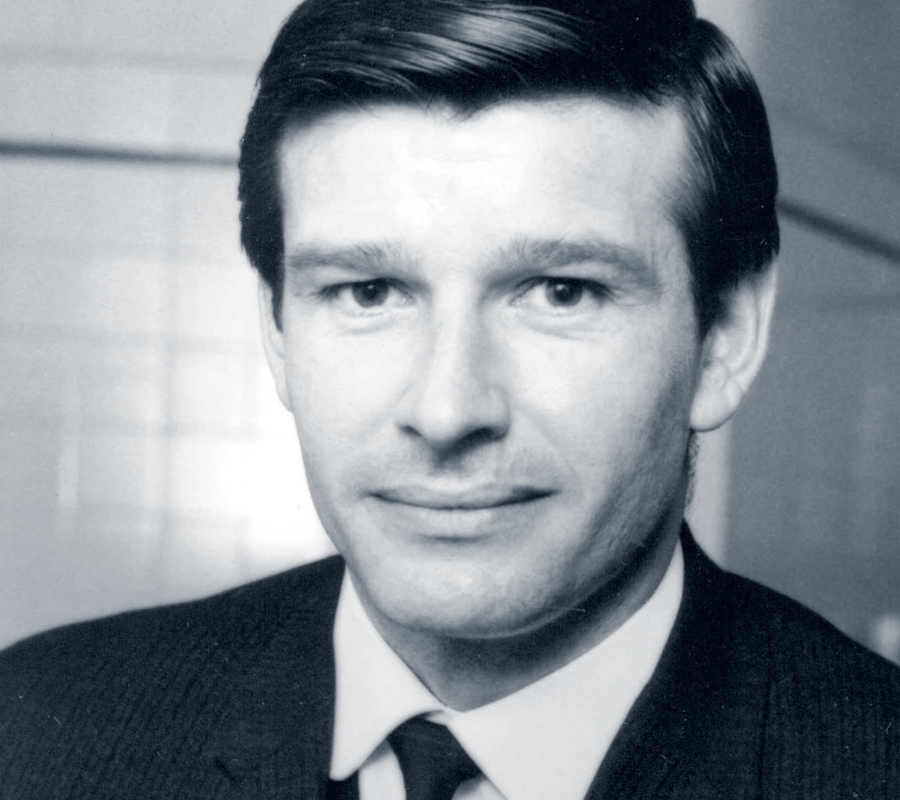Following on from his In2Views article with award winning columnist, broadcaster and journalist Doug Weatherall, Original Fat Bob has once again met up with him as Doug recalls his days involved with football and sportsmen at the highest level. We delve into his diaries to reveal never previously told facts and intimate stories, which helps to bring back to life what it was like to meet the footballing heroes and be part of the footballing community. Doug was lucky enough to be able to share moments in those great and heady days or commiserate at the dark times that often everyone in the football world endures. This Diary posted on our blog, is a view on the life and career of Stan Anderson…
 Stan Anderson joined Boro in 1965, he first captained the team before becoming player-manager in 1966 and continued as boss until 1973
Stan Anderson joined Boro in 1965, he first captained the team before becoming player-manager in 1966 and continued as boss until 1973When Doug and I considered who should be the subject for our next chapter when we opened the Diary, we both agreed it had to be the review of the life of, the late, great, Stan Anderson. Doug recently attended the funeral of Stan, accompanied by some of the great past players of his era. Included in the list of mourners were: David Mills, Len Ashurst, who delivered the eulogy at Stan’s funeral, Bobby Moncur, Mike Horswill, Jim Montgomery, George Herd, Doug Weatherall, Brian Usher & Bobby Kerr.
Stan died at his home in Doncaster, on Sunday 10th June 2018 aged 84, following a week where he had been hospitalized with chest pains. He was always naturally fit and was still a keen golfer right up until this year when he became ill.
“Stan was just a gentleman and a magnificent player,” said his former team-mate and Sunderland club ambassador Jim Montgomery. “I never heard him say a bad word about anybody. He was one of the best players I ever played with and he left Sunderland far too early.”
He was an all-round sportsman and excelled at his golf. “He would complete rounds in 77 or 78 shots, which was under his age and quite remarkable,” noted Montgomery at the funeral.
Stan Anderson was born in Horden in County Durham on 27 February 1934 and has the unique distinction of being the only player to have captained the big three football teams of the North East; Sunderland, Newcastle and Middlesbrough.
He joined Sunderland in 1949 as an amateur, signing as a professional on his 17th birthday in 1951 and made his debut in October 1952 at Roker Park against Portsmouth. Stan scored the first of his 35 Sunderland goals against Newcastle who he eventually joined in 1963. The only Sunderland player to be capped by England during the 1960s, Stan had captained his country at under-23 level and won an England B cap. One of his two full England caps is on permanent display at the Stadium of Light.
He didn’t really want to leave Sunderland and go to Newcastle, but he knew that Joe Harvey the manager was desperate for him to sign.
He is quoted in the book ‘Match of My Life’, when he reflected on his 1963 departure for Newcastle United.
“I knew there’d be trouble if I switched stripes and I was from a family of dyed in the wool red and whites – playing for the team I supported was always a privilege and a pleasure for me.”
He added: “I never wanted to leave Sunderland, but eventually Browny [Manager Alan Brown] bombed me out.”
After captaining Newcastle to promotion, he completed his north-east hat-trick by playing for Middlesbrough as captain.
He succeeded Raich Carter as Middlesbrough manager in April 1966 and remained at the club before resigning early in 1973, to be replaced initially on a temporary basis by Harold Shepherdson and then permanently by Jack Charlton. In his time at the Boro, the club were relegated from and then subsequently promoted back to the Football League second division. After leaving Middlesbrough he managed in Greece for AEK Athens FC. Returning to England, he became boss at Queens Park Rangers, Doncaster Rovers and Bolton Wanderers where he managed a young Peter Reid, before leaving management after resigning in 1981. He also had a spell as assistant manager with Manchester City. He later finished his football career as a scout for various clubs including Newcastle.
Doug’s Eulogy to Stan Anderson
OFB: Doug made this note just after Stan had died and contacted me. This is what he wrote then:
The North-East has lost one its most significant figures. Only he captained the area’s three main clubs. And I have lost a friend.
My most poignant memory of him was the night of Sunderland’s first relegation from the top division. We had travelled by train to London from Portsmouth where Sunderland’s fate had been sealed. We stayed at the Kings Cross’s Great Northern Hotel. While some of us downed our sorrows there Stan had just wandered around the West End. When he eventually returned to the hotel he told me just how relegation had hit him. A Horden, County Durham, lad, and a Sunderland fan, it hurt him deeply. Yet he had seen the happy faces of West Ham United players and fans as they arrived back in London from the North-East, knowing their club would take their place in the top grade.
 Stan Anderson grew up in house where his father supported Sunderland and his mother Newcastle and went on to captain both sides as well as Boro
Stan Anderson grew up in house where his father supported Sunderland and his mother Newcastle and went on to captain both sides as well as BoroHappily, I also shared Stan’s joy when, captaining Second Division Sunderland, he scored the two goals which beat First Division Arsenal in the FA Cup at Roker. He was the picture of joy, too, as he celebrated Newcastle’s promotion to the top grade by setting a new fashion – by flinging his shirt to joyous fans at St. James’.
While his Dad was a Sunderland fan, his Mum’s family club were the black-and-whites. The best tribute he was paid after he left Middlesbrough came from Jack Charlton, who replaced him as Middlesbrough boss. Big Jack said Stan had left him with a good squad of players. I hope Boro fans still appreciate his contribution to their club’s history.
Diary Extracts:
OFB: Did you know Stan from his early days?
DW: I was very much aware of him while he was still a schoolboy. Since I lived at Seaham, County Durham. I heard of this Horden Colliery lad who was showing class while playing for East Durham’s under-15s side. If my memory serves me right I saw him in action at Shotton Colliery Welfare and was impressed. He then progressed with distinction with Horden juniors before Sunderland signed him.
OFB: When did you first encounter Stan?
DW: As a Roker fan, I watched him play in Sunderland’s notable first team. He was a rarity: A North-East lad alongside costly members of the so-called Bank of England side. He turned out with great names like Len Shackleton and Trevor Ford and didn’t look out of place.
OFB: Was he instantly recognizable as a footballer who was destined for greatness?
DW: He was always a quality passer with two good feet. He could defend reasonably, but he was mainly a creative wing-half. In that era of 2-3-5 formations he could dispatch fine cross-field passes to his left-winger. You don’t see a lot of that these days; more’s the pity!
OFB: Do you think that he tried to emulate his style of play, on any individual player who played in his position?
DW: As a Sunderland supporter himself, he knew the high value of those long, accurate passes. He’d seen Willie Watson and Arthur Wright deliver them from wing-half positions.
OFB: When did you first get to know him personally?
DW: I got to know him personally and as a pal in my early days as a sports reporter. Apart from interviewing him about current football affairs, we could chat about our days as schoolboy players. Remember I’d played for Sunderland and District Boys, my team-mates having included Jack Webb and Billy Beadnell who, like Stan, had joined the professional red-and-whites.
OFB: Did you have long chats with him about his football?
DW: Yes, we did. Whilst he knew I was a professional journalist, he knew I wanted him and, indeed, all the other North-East clubs to succeed.
OFB: What do you think was his most memorable game, his own individual performance as a player?
DW: He, of course, often shone, but his best performance I remember most was in an FA Cup third-round tie with First Division Arsenal in 1961. Sunderland were then in the second grade, but, the skipper Stan inspired his team as he scored both goals in in a deserved 2-1 win. His side were to make the quarter-finals before losing in a White Hart Lane replay to League and Cup double winners Tottenham, Spurs captain Danny Blanchflower having conceded that his truly great team had narrowly escaped losing at Roker Park.
 Despite Stan’s obvious talent, he only managed two caps for England (pictured besides Bobby Moore) due to intense competition in his position
Despite Stan’s obvious talent, he only managed two caps for England (pictured besides Bobby Moore) due to intense competition in his positionOFB: Did you see him play for England?
DW: I didn’t see either of his two appearances for the full England team, but I know the main reason he didn’t gain more caps. Competition for wing-half places was so intense. Remember skipper Billy Wright, of Wolves, was generally the automatic right-half choice for ages.
OFB: What was your best personal and most enjoyable experience watching him as a player?
DW: I was so pleased for him in that Cup success over Arsenal, but I was even more delighted for him when, as captain of Newcastle, he led them to promotion to the top grade as Division Two champions. His transfer from Sunderland had been controversial. The Roker manager, then preferring Northern Irishman Martin Harvey for the No. 4 shirt, had negotiated Stan’s transfer to Sunderland’s most intense rivals. Fans on both Wearside and Tyneside couldn’t believe it. Stan himself had thought he’d be around Roker much longer. Stan’s Mum was from a Newcastle-supporting family, so you can imagine her delight and that of the Geordie masses when promotion was sealed with victory over Bolton at St. James’. In the celebrations Stan and his colleagues were in the directors’ box. And Stan was the first to set a pattern for years to come. He was the first to take off his shirt and hurl it into the hordes on the pitch. I never saw him happier. The saddest I’d seen him was late at night in London after Sunderland had been relegated for the first time in their history even though they’d won at Portsmouth that day. While some of us had drowned sorrows in the Great Northern Hotel Stan had wandered around West London. To rub salt into his wounds, he’d seen West Ham and their jubilant fans arrive back at King’s Cross Station. They were celebrating promotion to the division Sunderland had been in for 65 years.
OFB: What was his worst game in your experience?
DW: His worst game for Sunderland was probably his last. That was a 3-3 draw with Cardiff at Roker. His direct opponent was the great Ivor Allchurch, who won their personal encounter hands down. Coincidentally, Stan’s Newcastle debut was against Cardiff and again Allchurch was the master.
OFB: Did you follow his managerial career after he retired as a player and were you still in contact with him?
DW: Of course, I reported his transfer from Newcastle to Boro and was in regular contact with him as, in my opinion, he did fine work for Boro, first as their captain and then as manager
OFB: Who was in your opinion the manager that had the greatest influence on his career and why?
DW: Stan was very much his own man, but he learned a lot from Manager Brown at Sunderland. How, for instance, to deal with players, and how NOT to deal with them.
OFB: Which opposing team and which player did he fear playing against?
DW: Mentioning Ivor Allchurch again would probably be the answer to that one!
OFB: Do you know who was his favourite player of all time and why?
DW: Not too sure, but since he’d seen Len Shackleton at his amazing best, Shack would be an obvious contender.
OFB: What do you remember about Stan the most?
DW: Apart from his fine creative ability, I recall his warmth and friendliness as a human being. I recall, too, his being a good judge of a player. Fans should remember that Jack Charlton was always grateful for the playing talent Stan bequeathed him. Remember Jack’s squad was the nearest to winning the League title.
OFB: A huge thank you Doug, for taking the time to open your Diary again, revealing this latest chapter to Diasboro and our readers.
 Stan Anderson, born 27 February 1934 in Horden, County Durham
– died 10 June 2018 in Doncaster aged 84
Stan Anderson, born 27 February 1934 in Horden, County Durham
– died 10 June 2018 in Doncaster aged 84